I almost became a chef.
If I had taken that offer, my life would smell like rosemary and sizzling butter right now.
Instead, I’m here, writing about grammar.
Funny how language and life both turn on “ifs.”
One word can flip the whole story from what actually happened… to what could have happened.
That’s because of conditionals in English Grammar.
As the name suggests, conditionals are sentences that describe a condition and the result that depends on it.
They’re how we talk about facts, possibilities, dreams, and regrets.

And there are four main types of conditionals in English grammar, each with its own time frame, meaning, and structure.
In this blog, we’ll explore how each conditional type works, how to spot and build them, the common mistakes that trip writers up, and a few tricks for making them sound natural.
Let’s dive in.
Key Takeaways
- What are conditionals in English grammar? Conditionals are “if–then” sentences that connect a condition to a result, helping you talk about facts, possibilities, and hypotheticals.
- There are four main types of conditionals in English. Zero, First, Second, and Third, each tied to a different time frame and level of likelihood.
- Signal verbs and tenses (e.g., Present + Present, Past + Would) are your best clues for identifying the type.
- Meaning and speaker attitude such as confident, doubtful, or regretful can reveal the conditional type even when the grammar is tricky.
- Common mistakes include will/would confusion, tense mixing, and reality mismatches. These can be fixed by aligning time frame, likelihood, and verb choice.
- Formal vs informal English changes how conditionals sound, ranging from “Had I known…” in formal contexts to “If I was…” in casual speech.
What Is a Conditional Sentence?
What are conditionals in English?
A conditional sentence describes a situation and its possible result. It usually links two ideas: one is the condition, and the other is the outcome if that condition happens.
Conditionals in English grammar often appear with the word “if”, though other words like when, unless, or provided that, can also be used.


Never Worry About AI Detecting Your Texts Again. Undetectable AI Can Help You:
- Make your AI assisted writing appear human-like.
- Bypass all major AI detection tools with just one click.
- Use AI safely and confidently in school and work.
Every conditional has two parts:
- Condition clause (if-clause) – the situation or requirement.
- Main clause (result clause) – what happens if the condition is met.
For example:
- If it rains, we’ll stay indoors.
The first part tells you the condition (rain), and the second part shows the result (staying indoors).
The way a conditional works depends on verb tense and modal verbs like will, would, or could.
In English, there are four main types of conditional sentences:
- Zero
- First
- Second
- Third
- Mixed conditionals in English (special category).
Also Read: What is a Complex Sentence: Definition & Examples
Zero Conditional
- When to Use It: Facts, Rules, General Truths
The zero conditional in English grammar is used when something is always true under certain conditions.
It describes situations where the outcome is guaranteed with any guessing, or exceptions. If the condition is met, the result will always happen.
You’ll often see this form used for:
- Scientific facts: truths proven by science.
- Universal truths: things that never change.
- Automatic consequences: events that naturally follow a cause.
- Instructions or procedures: step-by-step rules.
The time frame here is present and timeless. It doesn’t describe the future or the past.
Only facts that stay true. Because these outcomes are certain, the certainty level is 100%.
- Structure: If + Present Simple, Present Simple
The zero conditional in English grammar uses this structure:
If + subject + base verb, subject + base verb.
Both clauses stay in the present simple because the statement describes something that is always true.
For example: If water reaches 100°C, it boils.
Also Read: Verb Forms—What Are They?
In many cases, you can replace if with when or whenever without changing the meaning:
- When the sun sets, it gets dark.
Punctuation depends on clause order. If the if-clause comes first, use a comma before the main clause:
- If employees arrive late, they must notify HR.
If the main clause comes first, no comma is needed:
- Employees must notify HR if they arrive late.
Examples:
- Scientific fact: If you heat water to 100°C, it boils.
- Rule: If employees arrive late, they must notify HR.
- Instruction: If the light turns red, press the reset button.
First Conditional
- When to Use It: Real Future Possibilities
The first conditional in English talks about situations in the future that are likely to happen if a certain condition is met.
The speaker believes the condition is realistic and achievable, with a probability level of about 50–90%. This form often appears in plans, predictions, warnings, promises, and even threats.
Examples of contexts:
- Plans: If the meeting finishes early, we’ll grab lunch together.
- Predictions: If traffic is bad, the train will be faster.
- Warnings: If you don’t leave now, you’ll be late.
- Promises: If you finish your homework, I’ll take you to the park.
- Threats: If you touch my laptop, I’ll delete your files.
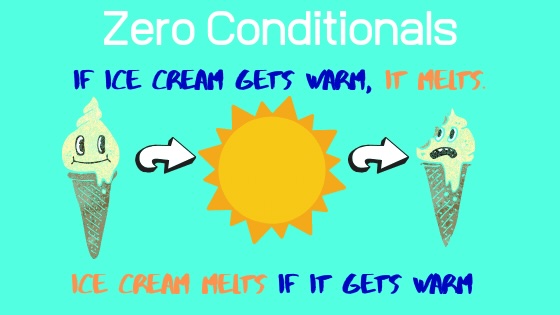
- Structure: If + Present Simple, Will + Base Verb
The first conditional in English follows this pattern:
If + subject + base verb (present simple), subject + will + base verb.
The future marker “will” appears only in the main clause, never in the if-clause. This structure is used to talk about real possibilities in the future.
You can adjust the level of certainty by replacing will with other modal verbs:
- Medium certainty: use can, may, or might.
- If you study hard, you might pass the exam.
- Different purposes: use could for possibility, should for advice, or may for permission.
Negative forms work in two ways:
- Start with “If you don’t…” to show a consequence: If you don’t wear a helmet, you could get hurt.
- Use unless to mean “if not”: Unless you book early, the tickets will sell out.
Examples with probability indicators:
- High certainty (≈90%): If it rains tomorrow, we will cancel the picnic.
- Medium certainty (≈60–70%): If you study hard, you might pass the exam.
- Warning: If you don’t leave now, you’ll be late.
Second Conditional
- When to Use It: Unreal, Imagined, Hypothetical Situations
The second conditional in English grammar is used for present or future situations that are unlikely or impossible. It creates a sense of psychological distance.
The speaker doesn’t expect the condition to actually happen, but uses it to imagine scenarios, express wishes, give advice, or make polite requests.
Common uses include:
- Dreams or fantasies: imagining an impossible reality.
- Wishes: describing what you’d like to be true but isn’t.
- Advice: offering guidance in a hypothetical situation.
- Politeness: softening a request or suggestion.
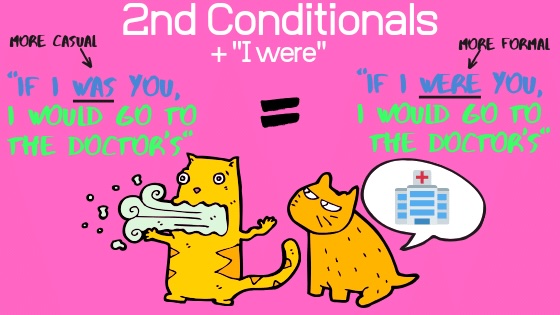
- Structure: If + Past Simple, Would + Base Verb
The second conditional in English follows this pattern:
If + subject + past simple verb, subject + would + base verb.
Even though it uses the past simple, it’s not talking about the past. Instead, the past form signals that the situation is unreal or imagined, something that isn’t happening now and is unlikely to happen in the future.
In formal English, we follow the “were” rule: use were for all subjects, not just plural ones.
For example: If I were you…, If he were here….
The second conditional can also soften the tone of a request. This is called its politeness function. Instead of being direct, you can make your request sound more courteous:
- If you could send the report today, I would be grateful.
Examples by function:
- Impossible: If I were a bird, I would fly around the world.
- Unlikely: If I won the lottery, I would buy a mansion.
- Advice: If I were you, I would apologize.
- Polite request: If you could help me, I would appreciate it.
Third Conditional
- When to Use It: Regrets and Hypothetical Past Situations
The third conditional in English grammar is used to talk about past events that didn’t happen and to imagine how things could have been different.
It’s tied closely to emotions like regret, criticism, or speculation. The key reality check: the condition did not occur, and the outcome is purely imagined.
You’ll often use this form to:
- Express regret: wishing you had acted differently.
- Give criticism: pointing out a past mistake.
- Speculate: guessing about alternate past outcomes.
Got a head full of “what ifs” and “if onlys”? Try running them through an AI Essay Rewriter in the third conditional.
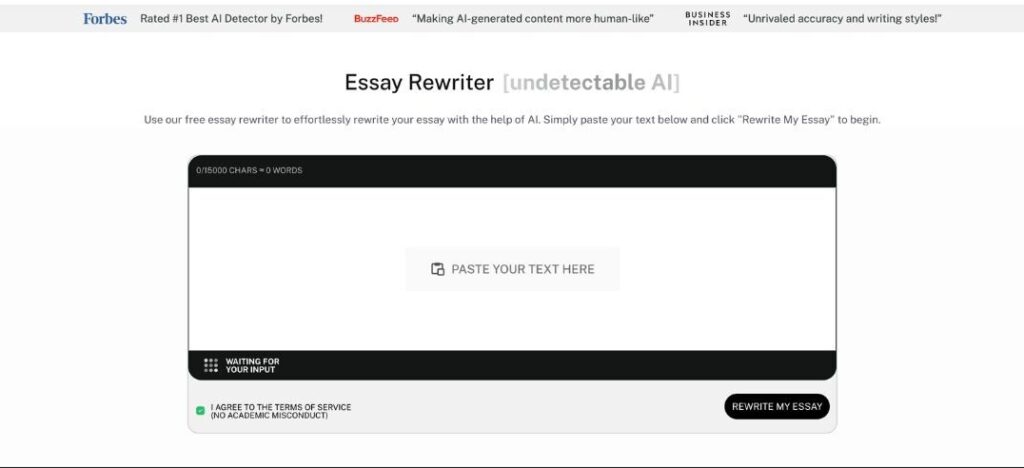
It’s a quick way to add emotional depth and polish to your writing.
- Structure: If + Past Perfect, Would Have + Past Participle
The third conditional in English follows this pattern:
If + subject + had + past participle, subject + would have + past participle.
Both clauses refer to completed past actions such as, the events that are already over and can’t be changed.
In everyday speech, people often shorten would have, could have, and might have to would’ve, could’ve, and might’ve.
These sound natural in conversation but should be written in full for formal writing.
You can also swap would have for other modal verbs to slightly change the meaning:
- Could have shows past ability: If I had known, I could have helped you.
- Might have shows past possibility: If she had called earlier, she might have joined us.
One common mistake is confusing the third conditional with the second conditional.
Here’s the difference: the second conditional imagines present or future situations, while the third conditional imagines how the past could have been different.
Examples:
- Regret: If I had studied harder, I would have passed the exam.
- Criticism: If you had been more careful, you wouldn’t have broken it.
- Speculation: If she had left earlier, she might have caught the train.
Mixed Conditionals
- Combining Second and Third Forms
Mixed conditionals in English are used when the condition and the result refer to different time frames. Unlike standard conditionals, where both parts sit in the same timeline, mixed conditionals in English cross time boundaries to show more complex cause–effect relationships.
There are two main types:
- Past condition → Present result
Used when a past event affects a current situation.
- Structure: If + past perfect, would + base verb
- Example: If I had studied medicine, I would be a doctor now.
- Present condition → Past result
Used when a current state explains why something happened differently in the past.
- Structure: If + past simple, would have + past participle
- Example: If I were more organized, I wouldn’t have missed the deadline.
These patterns require careful tense alignment so the meaning is clear. Inaccurate tense choice can change the time frame entirely.
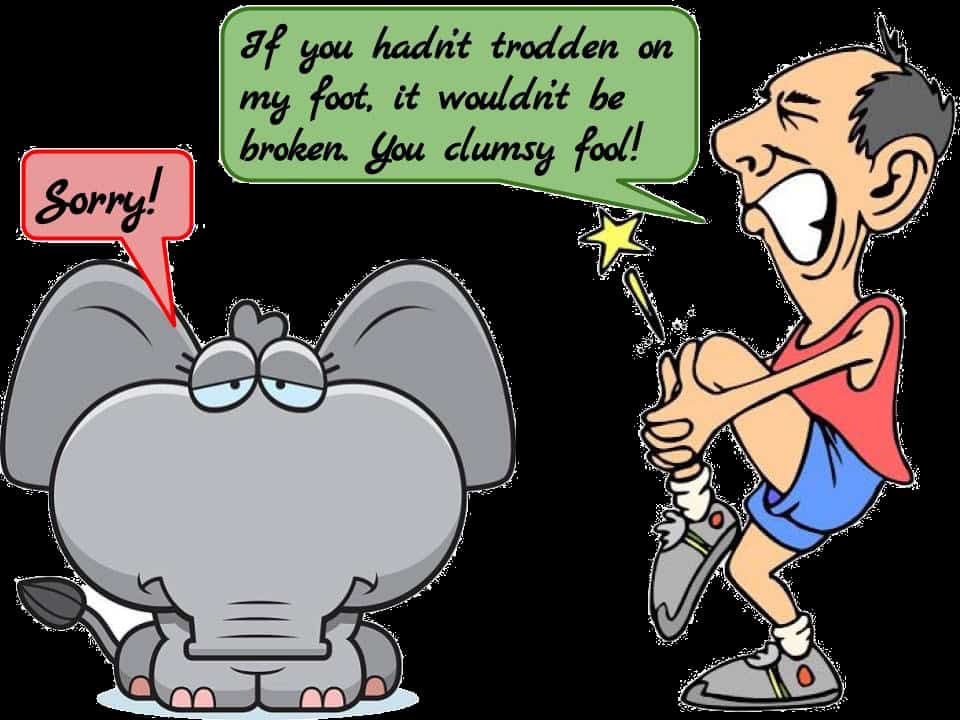
Get Access to Conditionals in English Exercises Here
- Complex Reasoning in Writing and Speech
Mixed conditionals in English are perfect when your reasoning crosses time boundaries, especially in situations that require analytical depth or subtle “what if” thinking. They appear often in:
- Academic writing for historical analysis or scientific hypotheses
- Debates where cause and effect stretch over different eras or situations
- Storytelling for alternate realities that feel layered and realistic
Signal words like still, by now, or at that time can guide the reader through the shifts in time.
Example: If I had taken that job, I would be living abroad now.
Because mixed conditionals in English juggle different time frames, it’s easy to slip up on verb tenses. A quick run through a Grammar Checker can help keep everything aligned.
How to Identify Conditional Types
Spotting which conditional you’re dealing with comes down to two things: grammar signals and meaning clues.
Understanding what are conditionals in English starts with recognizing these patterns.
- Signal Verbs and Tenses
Look closely at the verbs in each clause — they’re the dead giveaways:
| Structure | Conditional Type | Example | Time | Probability |
| Present + Present | Zero | If water boils, it turns to steam. | Always | 100% (fact) |
| Present + Will | First | If it rains tomorrow, we’ll cancel the picnic. | Future | High |
| Past + Would | Second | If I had more time, I would learn piano. | Now | Low |
| Past Perfect + Would Have | Third | If I had studied harder, I would have passed. | Past | 0% (impossible now) |
Modal markers:
- Will → First
- Would → Second
- Would have → Third
Time markers:
- “Always” → Zero
- “Tomorrow” → First
- “If only” → Second or Third
- “Yesterday” → Third
- Meaning and Time Frame as Clues
When in doubt, identify the conditional by asking what are conditionals in English trying to express:
- Is it always true? → Zero Conditional
- Is it possible in the future? → First Conditional
- Is it hypothetical right now? → Second Conditional
- Is it hypothetical in the past? → Third Conditional
Then check the speaker’s attitude:
- Confident or stating facts? → Usually Zero or First
- Doubtful or imagining unlikely scenarios? → Often Second
- Regretful about something that didn’t happen? → Almost always Third
- Visual Chart or Grid for Quick Reference
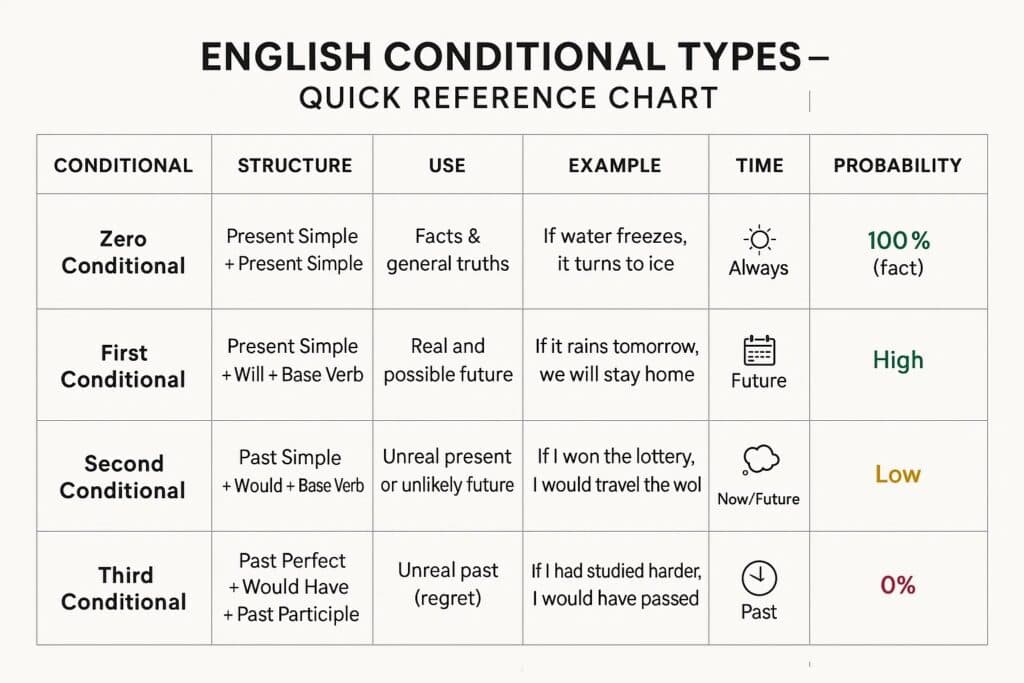
Conditional Sentences in Formal vs Informal English
Formal Characteristics of Conditional Sentences
- Use of full forms (“would” instead of “would’ve”).
- If she would accept the offer, we would proceed with the project.
- If she would accept the offer, we would proceed with the project.
- Subjunctive ‘were’ for all persons: If I were you…, If he were here….
- If I were in charge, I would allocate more resources.
- If I were in charge, I would allocate more resources.
- Frequent use of complex mixed conditionals in English to show nuanced time frames.
- If I had studied law, I would be a lawyer now.
- If I had studied law, I would be a lawyer now.
- Inverted conditionals for elegance: Had I known earlier, I would have acted differently.
- Had I known about the delay, I would have rescheduled the meeting.
Informal Variations of Conditional Sentences
- Contractions common in speech and casual writing: would’ve, could’ve, should’ve.
- We would’ve helped if you’d asked.
- We would’ve helped if you’d asked.
- “Was” instead of “were” in everyday conversation: If I was you….
- If he was here, we could start right away.
- If he was here, we could start right away.
- Dropping “if” in some contexts: Had I known… becomes I’d known….
- I’d seen her, I’d have said hi.
- I’d seen her, I’d have said hi.
- Simplified structures. Shorter sentences, less rigid grammar.
- If the system fails, call tech support.
If your conditionals sound a bit too stiff for the mood, run them through an AI Humanizer to give them a warmer, more natural flow.

Common Mistakes and How to Fix Them
Understanding conditionals in English grammar means avoiding these frequent errors:
- Will/Would Confusion in If-Clauses
Use present simple in the “if” part instead of “will” for future conditions.
Incorrect: If you will help me, I will finish faster.
Correct: If you help me, I will finish faster.
- Tense Mixing Within the Same Conditional Type
Keep both parts of the sentence in the same conditional tense pattern.
Incorrect: If I studied harder, I will pass the exam
Correct: If I studied harder, I would pass the exam.
- Reality Mismatches
Match the conditional form to whether the situation is possible, unlikely, or impossible.
Incorrect: If I were taller, I will join the basketball team.
Correct: If I were taller, I would join the basketball team.
Tip: A Grammar Checker can help spot when your conditionals don’t quite match the reality you’re describing, especially in longer writing.
Try running your draft through one before finalizing.
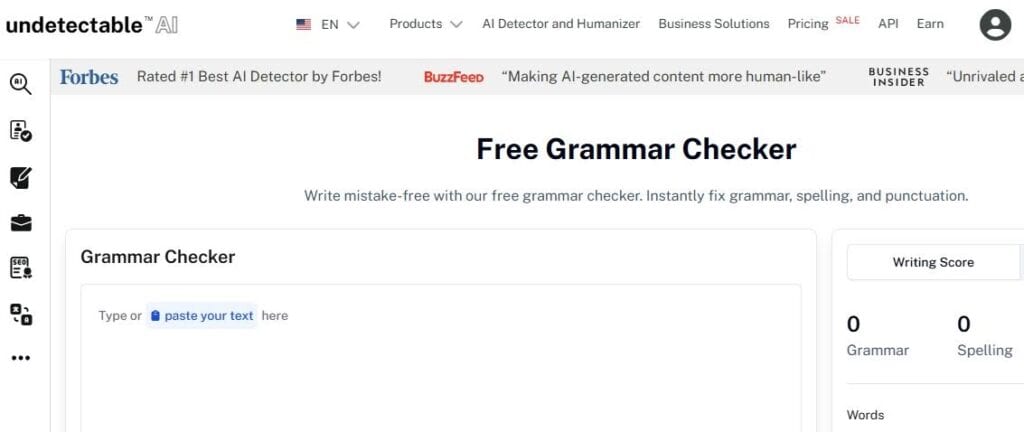
- Comma Placement Errors
Place a comma after the “if” clause when it starts the sentence.
Incorrect: If you work hard you will succeed.
Correct: If you work hard, you will succeed.
- Modal Verb Misuse
Use “would” for hypothetical results instead of “will” when the condition is not real.
Incorrect: If I could, I will help you.
Correct: If I could, I would help you.
Get instant feedback and improve your writing—try the tools in the widget below.
Final Thoughts
So what are conditionals in English?
Conditionals are choices.
The right one can pin down a fact, paint a dream, or rewrite the past in words.
They let you move through time without leaving your sentence.
One moment you’re stating what’s always true. The next, you’re wondering what could have been.
With Undetectable AI’s AI Grammar Checker, AI Humanizer, and AI Essay Rewriter, you can master conditionals, polish your writing, and make every sentence impactful.
Ready for the next step?
Take your grammar and writing skills further—start with Undetectable AI today.
